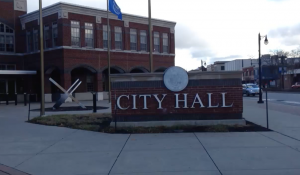
The package of tax increases and spending cuts known as the ‘‘fiscal cliff’’ takes effect in January unless Congress passes a budget deal by then. The economy would be hit so hard that it would likely sink into recession in the first half of 2013, economists say.
Illinois’ Democratic lawmakers are facing their own description of the fiscal cliff with the state’s impending financial crisis, including $139 billion in debt, with permanently higher tax rates on personal income.
Assistant Majority Leader Dick Durbin said in a statement, “The only way Congress can avoid the so-called fiscal cliff is through a balanced approach that cuts spending and raises revenue while asking millionaires and billionaires to pay their fair share.”
Economists say Americans have two reasons to worry: their taxes would go up and the fiscal cliff could cause a second recession that will threaten millions of jobs.
Illinois has America’s second-largest public debt per capita, $9,624, including state and local borrowing, according to the State Budget Crisis Task Force.
Chairman of the Federal Reserve, Ben Bernanke, stressed Tuesday, Nov. 20, the importance of a resolution to the fiscal cliff at The Economic Club of New York.
Economists, including Bernanke, describe Jan. 1 as an economic disaster if Congress doesn’t reach a compromise to cut the U.S. debt.
“A fiscal shock of that size would send the economy toppling back into recession,” Bernanke said.
In 2011, Illinois’ flat 3 percent individual income tax rate was raised to 5 percent, with the rate scheduled to fall to 3.75 percent in 2014. The 4.8 percent corporate tax rate jumped to 7 percent and was to drop to 5.25 percent in 2014. Lawmakers also put a 2 percent cap on annual spending growth through fiscal year 2015.
Public Information Officer at Illinois’ Department of Revenue, Susan Hofer, stated, “If in fact the federal government does not take action to keep low tax cuts in place, then we go back to the tax rates that were in effect in 2000.”
State officials warned that Illinois stands to lose more than $1 billion if Congress and President Barack Obama cannot reach an agreement to prevent the fiscal cliff brought on by preset tax increases and budget cuts.
Hofer said, however, “If the worst were to happen, and Congress were not to act on either of the tax rates, worst case scenario is the state could lose $800 million in tax revenue in Fiscal ’14.”
The latest national survey by the Pew Research Center for the People & the Press, conducted Nov. 15-18 among 1,002 adults, finds that nearly identical percentages of Republicans, 36 percent, and Democrats, 35 percent, say they very closely followed the debate over the automatic spending cuts and tax increases that will take effect at the beginning of next year unless the president and Congress act.
According to State Budget Solutions (SBS), state government debt amounts to $13,425 for every American and $37,486 for every private sector worker in this country.
Related articles
 Bernanke Warns of Dire Fiscal Cliff Fallout & Unsustainable Deficits(dailyfinance.com)
Bernanke Warns of Dire Fiscal Cliff Fallout & Unsustainable Deficits(dailyfinance.com)
 Bernanke to Congress: Avoid fiscal cliff(kansascity.com)
Bernanke to Congress: Avoid fiscal cliff(kansascity.com)
 Bernanke warns Congress to avoid ‘fiscal cliff’(newsobserver.com)
Bernanke warns Congress to avoid ‘fiscal cliff’(newsobserver.com)
 Fiscal cliff threatens economic recovery(bigpondnews.com)
Fiscal cliff threatens economic recovery(bigpondnews.com)
 Bernanke: Congress Must Raise Debt Limit To Prevent US From Defaulting(washington.cbslocal.com)
Bernanke: Congress Must Raise Debt Limit To Prevent US From Defaulting(washington.cbslocal.com)












Be First to Comment